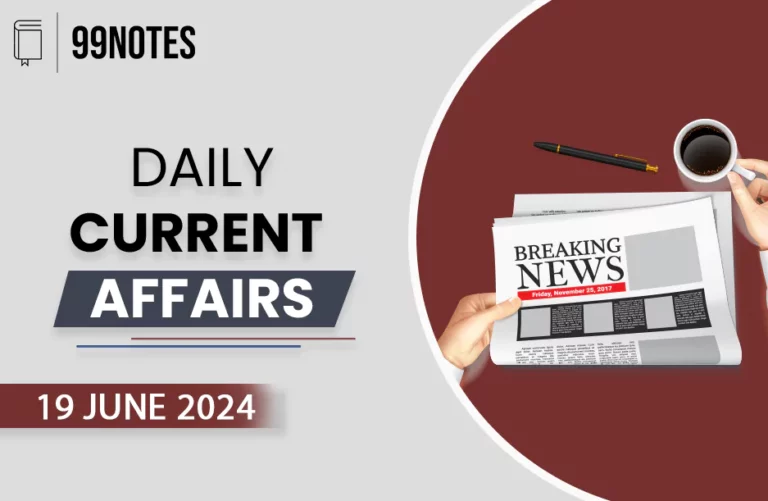23 Dec 2023 : Daily Current Affairs
Daily Current Affairs
23-December-2023
1. Delhi-Paris Pact: Macron to be Chief Guest this Republic Day
| Topic: GS2 – International Relations- Bilateral Relations This topic is not much relevant in the context of Prelims but more for Mains in the context of Indo-French Strategic Partnership |
| Context: |
|
Strategic Partnership:
- As they commemorate the 25th anniversary of their strategic partnership, France and India have a lot in common when it comes to regional and global concerns.
- Since its founding in 1998, the partnership has played a key role in promoting all-encompassing growth, especially in the areas of civil nuclear cooperation, defence, security, and space.
Bilateral Relations:
- Seventy-five years of intimate and cordial relations since the establishing of diplomatic relations in 1948 serve as a testament to the depth of the bilateral relationship between France and India.
- With France backing India’s claims for permanent membership in the UN Security Council and admission to international organisations like MTCR, WA, and AG, the Strategic Partnership has facilitated cooperation in a number of areas.
Expanding Cooperation
- New areas of collaboration have been added to the alliance throughout time, including as cybersecurity, digitization, counterterrorism, climate change, renewable energy, and marine security.
- Both countries actively seek the UN’s passage of the Comprehensive Convention on International Terrorism (CCIT) and have long condemned terrorism.
Leadership Interactions
- President Macron and Prime Minister Modi’s regular encounters have improved relations.
- Following Macron’s victory for a second term in office, Modi will be meeting Macron for the first time as a world leader after his May 2022 visit to Paris.
- They are involved in gatherings such as the G20 in Bali and the G7 in Hiroshima.
Economic Collaboration:
- Macron and Modi virtually attended the introduction of Air India and Airbus, one of the economic partnerships between France and India.
- Macron’s visit is regarded as evidence of the two countries’ continuous support and collaboration in a variety of fields.
Conclusion:
- The fact that Macron is the Chief Guest for Republic Day highlights the long-standing and complex relationship that exists between France and India on a political, economic, and strategic level.
- It is anticipated that the visit will deepen relations and increase cooperation
between the two countries.
| Strategic Partnerships |
|
| PYQ: Critically examine the procedures through which the Presidents of India and France are elected. (UPSC CSE (M) GS-2 2022) (150 words/10 m) |
| Practice Question: Discuss the evolution and key milestones in the India-France Strategic Partnership. How has this partnership contributed to the comprehensive growth of India-France relations over the years? (250 words/15 m) |
2. Aadhaar, PMLA as money bills: SC to hear pleas in Jan
|
Topic: GS2 – Polity This topic is relevant for both Prelims and Mains in the context of constitutional provisions |
| Context: |
|
Background:
- A petition challenging the government’s supervision of Tribunals served as the impetus for the legal dispute.
- This petition eventually made its way to a five-judge court, along with others that contested the Aadhaar Act’s designation as a money bill.
- It was then sent to a bench of seven judges for additional review.
Money Bills and Legislative Process:
- One of the main points of disagreement put out by the petitioners is the designation of important laws as money bills, a procedure that only permits their introduction in the Lok Sabha and shields them from rejection by the Rajya Sabha.
- Opponents contend that the administration is using this designation purposefully to avoid possible challenges in the Rajya Sabha, where it does not have a majority.
Legal Implications
- According to the petitioners, this kind of classification has been employed to prevent undesirable consequences during the legislative process.
- In order to address issues with legislative accountability and transparency, the Supreme Court will hold a hearing to examine the legal and constitutional implications of labelling important laws as money bills.
Significance of the Case
- The seven-judge bench’s ruling may have a significant impact on how money bills are interpreted and how legislative processes are carried out.
- The case emphasises how important it is to conduct a thorough analysis of the constitutional precepts guiding bill classification in order to guarantee an impartial and open legislative process.
Conclusion:
- The Supreme Court’s impending hearing on the legality of laws classified as money bills, such as the PMLA amendments and the Aadhaar Act, represents a significant legal issue that will influence how legislative processes and constitutional principles are understood in the Indian context.
| What is a Money Bill? |
|
Definition:
Constitutional Basis:
Procedure:
|
|
PYQ: Regarding the Money Bill, which of the following statements is not correct? Prelims (2018)
Ans: (3) |
| Practice Question: Critically analyze the constitutional and legal implications of categorizing significant legislations as money bills. (150 words/10 m) |
3. Half of the Bills passed debated for less than 2 hrs each: Report
| Topic: GS2 – Polity and Governance This topic is not much relevant in the context of Prelims but more for Mains in the context of Governance and Legislative Efficiency and Role of Committees. |
| Context: |
|
Bill Discussion and Passage:
- 172 bills were discussed and passed in the 17th Lok Sabha before the just ended Winter Session. Of these, the Rajya Sabha passed 103 (60%) while the Lok Sabha passed 86 (48%) of them.
- Both the Lok Sabha and Rajya Sabha approved bills after two to four hours of deliberation.
Decrease in Committee Referrals:
- The data shows that the percentage of bills submitted to committees has significantly decreased, from 71% in the 15th Lok Sabha to 16% in the 17th Lok Sabha.
- This decrease begs the question of how carefully laws are inspected and evaluated before they are passed.
Conclusion:
- PRS Legislative Research’s analysis indicates a trend towards more laws passing with little debate and a marked decrease in the number of measures sent to standing committees.
- These results bring up important issues regarding the effectiveness and scope of the 17th Lok Sabha’s legislative process.
| PYQ: Explain the structure of the Parliamentary Committee system. How far have the financial committees helped in the institutionalization of Indian Parliament? (250 words/15m) (UPSC CSE (M) GS-2 2023) |
| Practice Question: Parliamentary committees play an important role in exercising effective control over executive. How far do you agree with the argument that role of parliamentary committees has been declining in Indian Parliamentary functioning? (250 words/15 m) |
4. India-made LCA, LCH can boost clout in Global South: IAF Chief
| Topic: GS3 – Defence technology, Prelims This topic is relevant for both Prelims and Mains in the context of Security Challenges and Defense Strategies. |
| Context: |
|
Mutually Beneficial Joint Ventures:
- Chaudhari proposed that it may be advantageous for both parties to establish collaborative ventures with nations who are interested in these platforms.
- He suggested working together to develop components in tandem, share production facilities, and establish local hubs for maintenance and support.
- The goal of this strategy is to promote technological and economic cooperation.
Focus on Capability Development and Collaboration:
- The Air Chief emphasised the significance of emphasising the formation of maintenance, repair, and overhaul (MRO) facilities, manufacturing centres, and capability development in global supply chains.
- To bolster India’s standing in the aerospace industry, he promoted cooperative R&D initiatives, defence innovation, and technology transfer.
IAF’s Role in Collective Progress
- Chaudhari talked about how the Indian Air Force (IAF) can be a force for good, building strategic alliances and advancing the Global South as a whole.
- He emphasised how the IAF has expanded its reach through frequent training sessions with partner countries, which have resulted in the exchange of best practices for operations and maintenance.
Training Initiatives and Cooperation
- The Indian Military Advisory Teams and the courses provided by the Indian Technical and Economic Cooperation programme were recognised by the Air Chief for their important contributions.
- Training over 200,000 officials in the defence and civic sectors has been made possible by these programmes.
- In the last nine years, the IAF has trained over 5,000 international trainees.
Identifying Contemporary Security Challenges
- Chaudhari emphasised the importance of identifying the modern security issues that the Global South, including India, are facing.
- He stressed the significance of having a single forum to address issues like cyber threats, terrorism, regional conflicts, and other shared concerns related to changing security environments.
Shifting International Relations and Global Challenges
- The head of the IAF emphasised how new players are upending established power structures in the dynamic field of international relations.
- He outlined the interrelated problems brought about by international conflicts, ideological differences, the depletion of natural resources, climate change, economic inequality, and resource exploitation.
Conclusion:
- In his speech, Air Chief Marshal V R Chaudhari reaffirmed India’s goal of becoming a more powerful force in the world by working with other countries on defence and aerospace projects and providing the Global South with competitive solutions.
| What is a Light Combat Helicopter? |
About:
|
| PYQ: How is S-400 air defence system technically superior to any other system presently available in the world? (150 words) S-400? (UPSC CSE (M) GS-3 2021) |
| Practice Question: Examine the strategic significance of indigenous aerospace platforms, including the Light Combat Aircraft and Akash Missile systems, in boosting India’s economic and technological influence in the Global South. (150 words/10 m) |
5. 2024 will have more seven-judge Benches hearing crucial matters in Supreme Court.
| Topic: GS2 – Indian Polity – Judiciary. UPSC Significance: SC’s seven-judge Benches tackle constitutional, legislative dilemmas, vital for aspirants understanding governance, law, and rights. |
| Context: |
|
Crucial Issues:
- Multiple seven-judge Constitution Benches to address significant issues in the upcoming year.
- Topics include Money Bills, sub-classification of Scheduled Castes and Scheduled Tribes, breach of privilege, Speakers’ authority, minority-run educational institutions, and validity of State laws on sales tax surcharge.
Bench Composition:
- Various cases to be heard by a seven-judge Bench led by Chief Justice of India D.Y. Chandrachud in January 2024.
Broad Legal Spectrum:
- Encompasses a diverse range of legal issues, from constitutional validity to legislative authority, impacting governance and fundamental rights
| Lack of Constitutional benches in the Supreme Court |
Issue:
Impact:
Way forward:
|
| PYQ: Discuss the reasons for the pendency of cases in the Supreme Court and suggest measures to overcome it. (UPSC CSE (M) GS-2 2017) (150 words/10 m) |
| Practice Question: Discuss the significance of the Supreme Court’s multiple seven-judge Constitution Benches in 2024, addressing diverse legal challenges. (150 words/10 m) |
6. Maoists blow up railway tracks in Jharkhand; trains halted at stations.
| Topic: GS3 – Internal Security UPSC Significance: Understanding the CPI(Maoist) disruption is crucial for aspirants, examining security challenges, internal conflicts, and governance in affected regions. |
| Context: |
|
Maoist Activity in Red Corridor: A Multifaceted Challenge
Understanding the Landscape:
- Predominantly rural: Concentrated in remote, forested areas known as “Red Zones” across central and eastern India.
- Ideological roots:Inspired by communist revolutionary Mao Zedong, aiming for social and economic revolution against perceived state oppression.
- Tactics:Guerrilla warfare, extortion, propaganda, and recruitment from marginalized communities.
Impact on Affected Regions:
- Security concerns:Frequent clashes with security forces, leading to casualties and disruption of public life.
- Development hurdles:Infrastructure projects stall due to security risks, impacting local economies and access to basic services.
- Social division:Exploitation of existing grievances and caste tensions, creating divisions within communities.
Current Efforts:
- Multi-pronged approach:Combining security operations with development initiatives, addressing root causes like poverty and lack of opportunity.
- Focus on welfare: Strengthening government presence through improved administration, education, and healthcare in Red Zones.
- Dialogue and outreach: Engaging with local communities and addressing their concerns, promoting alternative political participation.
Challenges and the Way Forward:
- Balancing security with human rights:Ensuring adherence to legal frameworks while maintaining public safety.
- Addressing poverty and inequality:Long-term economic and social development programs are crucial for lasting solutions.
- Breaking the cycle of violence: Promoting reconciliation and dialogue between affected communities and the state.
Conclusion:
- Maoist activity remains a complex challenge in India, requiring a nuanced and comprehensive approach.
- Balancing security measures with development initiatives, promoting social inclusion, and addressing root causes of disaffection are key to finding lasting solutions and building a more peaceful future for Red Zone communities.
| PYQ: Discuss the major internal security challenges faced by India. How can technology be used to address these challenges? (UPSC CSE (M) GS-3 2018) (150 words/10 m) |
7. India’s rise in Global South marks a pivotal point, says IAF Chief.
|
Topic: GS2 – International Relations UPSC Significance: Understanding IAF’s role in fostering military cooperation contributes to aspirants’ knowledge of national security, foreign relations, and global strategic partnerships. |
| Context: |
|
India’s Rise as a Leader for the Global South:
Historical Role and Emerging Power:
- Shared history and struggles:India’s experience with colonialism and development resonates with many nations in the Global South.
- Economic growth and global influence:India’s rising economic and military power grants it a stronger voice on the international stage.
Championing South-South Cooperation:
- Development assistance and technical expertise:Sharing India’s experience in areas like agriculture, healthcare, and IT through various initiatives.
- Promoting trade and investment:Leading efforts to build regional trade blocs and advocating for fairer global trade deals.
Global Governance and Multilateral Reform:
- Pushing for equitable representation:Advocating for reforms in international institutions like the UN to reflect the interests of the Global South.
- Championing climate action and sustainable development:Leading initiatives to combat climate change and promote sustainable practices.
Challenges and the Path Forward:
- Balancing domestic priorities:Aligning global leadership role with domestic development needs and challenges.
- Building consensus and navigating diverse interests:Ensuring cooperation and unity among various countries within the Global South.
- Strengthening soft power and cultural influence:Projecting India’s rich culture and values alongside its economic and political contributions.
Conclusion:
- India’s rise as a leader for the Global South presents both opportunities and challenges.
- By leveraging its strengths, advocating for shared interests, and building bridges, India can play a crucial role in shaping a more just and equitable world order.
8. ‘Economic scenario turning benign’
| Topic: GS3 – Indian Economy UPSC Significance: Understanding MPC discussions on inflation and growth aids aspirants in economic policy comprehension, vital for governance and economy-related questions |
| Context: |
|
Key Concerns:
- MPC members, as per the released minutes, express concerns over containing inflation and reviving economic growth.
Economic Environment:
- MPC member Jayant Varma notes a more favorable economic environment but underscores the need for a restrictive monetary policy to balance inflation and robust growth.
Monetary Policy Challenges:
- Varma highlights two requirements: maintaining a restrictive monetary policy for inflation targeting and preventing excessive real interest rates as inflation decreases.
Inflation Projection:
- Current projections suggest inflation below 4.75% in the next two to four quarters.
- Real interest rates, at 6.75%, are seen as more than 2%, indicating the need for caution.
Inflation Vulnerabilities:
- Deputy Governor Michael D. Patra underscores inflation vulnerability to food price spikes, leading to persistent price pressures.
Consumer Sentiment:
- Consumers express increased uncertainty about inflation three months ahead, revealing more pessimism about inflation a year ahead.
RBI Governor’s Outlook:
- Governor Shaktikanta Das acknowledges a receding trend in food inflation but highlights its elevation.
- Overall inflation outlook clouded by volatile food prices and intermittent weather shocks.
Monetary Policy Stance:
- MPC members, including RBI Governor Das, stress the need for a high-alert restrictive monetary policy stance given prevailing economic uncertainties.
|
Monetary Policy Committee |
|
For Enquiry

23 Dec 2023 : Daily Quiz

23 Dec 2023 : Daily Answer Writing

23 Dec 2023 : Indian Express

23 Dec 2023 : Daily Current Affairs

23 December 2023 : The Hindu Editorial Notes PDF

23 Dec 2023 : PIB

22 Dec 2023 : Daily Quiz

22 Dec 2023 : Daily Answer Writing

22 Dec 2023 : Indian Express

22 December 2023 : The Hindu Editorial Notes PDF
Daily Quiz 23 Dec 2023 : Daily Quiz 23 Dec 2023 : Daily Quiz…
mains answer writing 23 Dec 2023 : Daily Answer Writing Mains Answer Writing
23-December-2023
Q1) What were the driving forces for the paper partition of Africa?…
december 2023 indian express 23 Dec 2023 : Indian Express Indian Express
23- December-2023
1. Grand gesture,small details
Topic: GS2 – International Relations
This…
Daily Current Affairs 23 Dec 2023 : Daily Current Affairs Daily Current Affairs
23-December-2023
1. Delhi-Paris Pact: Macron to be Chief Guest this Republic Day
Topic:…
December 2023 The Hindu 23 December 2023 : The Hindu Editorial Notes PDF The Hindu Editorial
23-December-2023
1. Telecom law upgrades for a digital authoritarian state.
Topic:…
December 2023 Pib 23 Dec 2023 : PIB PRESS INFORMATION BUREAU
23-December -2023
1. INDIAN OCEAN NAVAL SYMPOSIUM (IONS) – 2023.
Topic:…
Daily Quiz 22 Dec 2023 : Daily Quiz 22 Dec 2023 : Daily Quiz…
mains answer writing 22 Dec 2023 : Daily Answer Writing Mains Answer Writing
22-December-2023
Q1) Among the manifold factors behind the unification of Germany,…
december 2023 indian express 22 Dec 2023 : Indian Express Indian Express
22- December-2023
1. A Valley of growth
Topic: GS2 – Polity- Federalism
This topic…
December 2023 The Hindu 22 December 2023 : The Hindu Editorial Notes PDF The Hindu Editorial
22-December-2023
1. Questionable searches under the Money Laundering Act.
Topic:…



